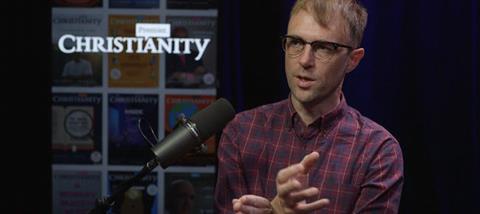
Politics is broken, the country is in a mess and we're all more divided than ever.
At least that's what most people seem to think. Whether it's Brexit in the UK or Trump in the US, our world is becoming increasingly polarised, they say. Our society is crumbling and democracy is in danger, etc etc.
It all sounds a little apocalyptic doesn't it?
I recently had the pleasure of interviewing the Australian cultural commentator, author and pastor Mark Sayers. (You can read our conversation in full in the next issue. Subscribe here)
Mark has an unusual take on the state of our world, but I've a feeling he's right. Here's what he told me:
"I was looking at Twitter on my way to pick my kids up from school. And it was just polarisation – people calling each other out, saying the country was polarised, and it was just stressful. So I turned it off, walked into the primary school. And there was this mum that came in with a new baby, and all of a sudden these mothers gathered around and one mother was like, tattoos everywhere; this other mother came in, she was wearing an Islamic staff; another mum in her fitness gear – and they were all just talking. And I just thought, “this is the real world”.
It's also too easy to make sweeping generalisations about what "the country", or even "the public" are feeling and thinking, as Mark explained:
"Soren Kierkegaard wrote a really interesting book called The Present Age. And in it he attacked a tendency that was emerging in the West, which now is everywhere – and that’s the concept of ‘the public’. And we talk about ‘the public’ as if it’s a person who rocks around with one set of ideas in their head. And the reality is the public is so broad. I often will sit in my office – I can see the street – and I just watch who goes by. There’s an Iranian guy and there’s a Vietnamese-Australian mum and there’s a white businessman – they all think different things. And sometimes they think different things at different times of the day.
"There is evidence now in America that more people believe in UFOs than are atheists – those sorts of statistics aren’t spoken about. So I actually think we’ve bought this myth that Christian renewal looks like the public changing their mind – it’s never looked like that. The Church has always been a healing, creative minority. The end of Revelation isn’t when public relations gurus in the church get 87% of people believing in Christ. It’s actually about the Church showing the kingdom of God and being faithful to Christ’s mandate and message for them."
Of course, there are real problems with our political system right now. We must pray and we must each play our part in bringing healing. But even if you're addicted to watching the BBC Parliament channel, the truth is, most people are not. Most people are getting on with their day-to-day lives.
The challenge for the Church is to keep the main thing the main thing. This world is being shaken, but we are part of a kingdom that cannot be shaken. (Hebrews 12:28)
Could it be that this current shaking is a way of God humbling us as a nation? Sayers seems to think so:
"Lesslie Newbigin had a really interesting view of secularism – he believed that secularism was something which came against all belief, and shook any foundations of authority, and left humans only being able to rely on the foundation of God. And I feel like we’re part of that – everything from #MeToo, to Brexit, to political scandals, to FIFA corruption – you know. Whatever you put your hope on – environmentalism – there is this shaking of the world; people desperately want a better world. So I see in that, people looking for renewal, and Christians have a part to play in looking for renewal.
"There’s this sense that there’s almost a humbling and an embarrassment. I feel like that with people here in the UK, they’re almost apologising to me. And what if this is a humbling that God’s allowing? I walk around here - the far reaches of the British Empire – as an Australian, knowing how my city was touched by that empire. But what if God takes away a political, economic empire, and offers back a spiritual kind of influence that goes in both directions? So it’s not one of triumphalism and domination, where west Africans and Filipinos and Brazilians come to London, but it goes in two directions. So I have this sense that God wants to do something through the UK. I feel American evangelicalism is going through a period of reckoning and God is using some of the humility of the UK Church as another counter voice in the English speaking church."
Read the full interview with Mark Sayers in the next issue of Premier Christianity magazine. Subscribe here



























